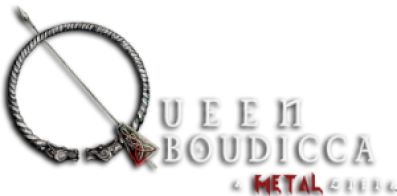Transatlantic conversations #1
These blog entries are answers to questions posed by Ellen Beare, a Classics student at Royal Holloway University of London, as part of the research for her third year dissertation paper discussing the portrayal of Queens in Opera.
I was working on a Celtic influenced Metal project with my son Rob and he asked me to write something for the album. Co-incidentally, I happened to see a documentary about Boudicca’s revolt on the History Channel. At the time I had never heard of Boudicca and was completely unaware of her story. I was surprised at my own ignorance, and at the fact that this bit of history is so obscure to the majority of people. But the thought that struck with the most impact at the time was “What was it like for Boudicca to look around the battlefield after her defeat and realize that she had led her people to utter destruction and slaughter? ” Boudicca is mostly viewed as an icon of female courage and savagery, but I was more attracted to the idea that she was a real person, and subject to the same feelings of guilt and responsibility that we all feel.
As I began to complete more of the Opera, my research quickly showed that there is very little that is really known about Boudicca. I decided that the writings of Tacitus, although extremely brief, along with documented archeological evidence were the best sources of information. However, the evidence was so sketchy and minimal, I felt I had no choice but to make my best guesses as to Boudicca’s real character, based as closely on these sources as possible. I included those things about Boudicca’s character that are historically documented, including her brutality ( “The Sacrifice”), but adhering strictly to the history would have created a very one dimensional character.


“What prompted you to tell Boudicca’s story in the first place?”
The song “Aftermath” was one of the first pieces I completed, it’s lyric outlines the most compelling reason for me to tell her story as I imagined it. The initial songs I wrote never made it into the project, but I kept returning to the idea and eventually completed the Opera.
“With regards to Boudicca’s characterisation, what evidence was this based off, and were there any key traits you prioritised? ”
Since I could find no evidence that Boudicca had ever led any military campaign prior to her revolt, I decided to go on the assumption that she was happy being a Queen and a mother up until the time of her husband’s death, the rape of her daughters, her own scourging, and the confiscation of their Kingdom by the Romans. Although I feel there are strongly feminist themes throughout the piece, I also feel that true freedom of choice for a woman includes choosing more traditionally feminine roles if that is what she really wants.
Following this idea further (and once again making my best guess to flesh out a character that is primarily dramatic, and not a strictly historic one), I had my depiction of Boudicca include some self doubt regarding her own ability as a leader ( in the song “No One but Me”).
As I had learned that Andraste was most likely Boudicca’s guardian Goddess, I had her pray for guidance ( the song “Prayer” and it’s reprise). Boudicca then returns to announce that she will lead her people in battle.
The song “Savior” has a disturbing undertone of barely controlled militarism and represents the beginning of the end for Boudicca. Once she has decided to become her people’s savior, her fate is sealed and there is no turning back. The string line of the coda of “Savior” is based on the introduction of “Aftermath”, and as the Bard sings in the prologue “for them that Savior choose to be, a chilling tale of caution”.
The next aspect of the characterization of the Warrior Queen is outlined in the song “Follow Me”. I assumed that Boudicca was a powerfully persuasive woman, she convinced a group of Celtic warlords to join her in a revolt against one of the most powerful military entities in history- the Roman Empire! I also assumed that Boudicca was a brilliant natural military strategist. Her first choice of targets was Camulodunum, which was essentially a retirement home for Roman officers, but I was also fascinated by the accounts of omens that the citizens of the cities that Boudicca’s army annihilated were reported to have seen.
“River of Blood ” (the river ran red with blood), “Idol Falls” (the statue of Victory fell face down), “Demons Above” (demon voices were heard in the Senate building) and “Omens reprise” ( outlines of corpses were seen on the shores, birds fell dead from the sky), constitute my idea of what these Omens really were: They were an extremely clever and successful propaganda campaign carried out by the Celts, and masterminded by their Queen! By the time Boudicca’s army attacked, the Romans were so frightened and demoralized they must have had great difficulty defending against her. I feel that this aspect of the Celtic character is still evident in the UK to this day, so assuming that the ancient Celts resorted to craft and trickery to prevail seems a lot more likely than acts of the Gods
In the second act, Boudicca is once again faced with an uncomfortable choice – to let Romans flee the cities she has conquered, or to actively pursue them as advocated by Asceawa, her second in command. Her confusion in “Prayer reprise” is another humanizing trait that helps create empathy in the audience, but has no real basis in the history.
Although Boudicca ultimately faced defeat at the hands of Roman General Suetonius, in my mind she was his equal in bravery and strategy. The reason she was defeated is the same as with two equally matched chess masters- the one with the greater knowledge ( memorized games) will win. Boudicca simply could not match with talent and intellect what one of Rome’s two greatest Generals had learned from the training provided by the greatest military power the world had ever known.
As I said previously, the song “Aftermath” is what the entire piece leads up to. Although there is no documentation to support it, this lyric depicts a woman who attempted to do everything right, who answered the call of her people with great courage and resourcefulness, and who ultimately had to face the responsibility of leading her people to crushing defeat. She realizes she has done the best she could, and although she still wears her “torc and not the Roman yoke” ultimately it is “not enough”. The ultimate cruelty is that she is even denied a “warrior’s death”, she must face what she has done.
So, I interwove my own speculations and theories with the best history I could find to create my version of Queen Boudicca’s character. Although we can never be sure, I have a feeling I might be pretty close to her true character.
